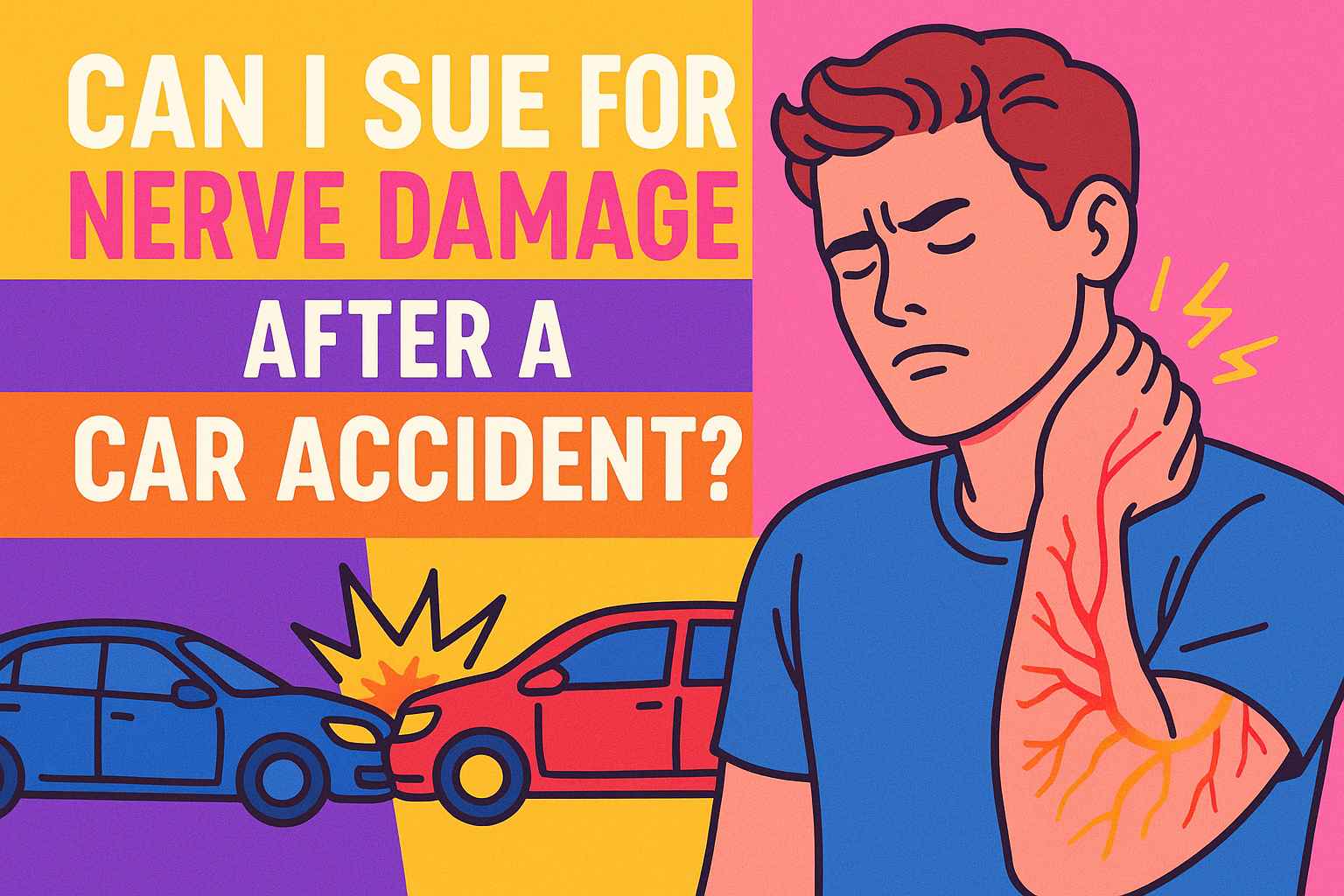Sue for Nerve Damage After a Car Accident

Can I Sue for Nerve Damage After a Car Accident?
Nerve injuries can change every part of life—how you move, how you sleep, and even how you earn a living. After a collision on a busy San Francisco street or a winding Bay Area highway, many victims wonder whether they can hold the at-fault driver accountable for the full scope of their losses. The answer is yes: California personal injury law allows you to sue for nerve damage after a car accident when another party’s negligence caused your injuries. This long-form guide explains the medical realities of nerve trauma, the legal standards that shape these cases, and the practical steps you should take to protect your future.
Understanding Nerve Damage After a Crash
Car crashes often involve sudden stops, twisting forces, or direct blows that stretch, compress, or sever delicate nerve fibers. Unlike bone fractures, nerve cells do not always heal completely, and partial recovery can take months or years.
- Peripheral nerve damage occurs when nerves outside the brain and spinal cord are bruised, crushed, or lacerated.
- Radiculopathy refers to nerve root irritation, usually in the neck or lower back, that radiates pain, tingling, or weakness down an arm or leg.
- Spinal cord injury may result when vertebrae fracture or discs herniate, pressing on the cord and disrupting signals between the brain and body.
Even a low-speed impact can trigger lasting neuropathic pain, numbness, or loss of fine motor skills—symptoms that are hard to see but easy to feel every day.
Common Signs and Diagnostic Tests
Early detection drives better outcomes. Seek medical care if you notice:
- Shooting pain, electric-shock sensations, or burning in your limbs
- Persistent numbness or “pins and needles” feelings
- Muscle weakness, loss of grip strength, or foot drop
- Unusual sensitivity to touch, heat, or cold
Doctors typically confirm a nerve injury with MRI scans, electromyography (EMG), or nerve conduction studies. Prompt testing creates a clear link between the collision and your condition, which becomes vital evidence when you seek compensation.
The Legal Basis for Suing in California
California follows a fault-based system for auto accidents. To recover damages, you must prove four elements:
- Duty of care – Every driver must operate a vehicle safely and obey traffic laws.
- Breach – The defendant acted unreasonably, such as by speeding, texting, or running a red light.
- Causation – That breach directly caused the collision and your nerve damage.
- Damages – You suffered measurable losses: medical bills, lost wages, pain, and future costs.
If all four are met, you may sue for compensatory damages, which include both economic (tangible) and non-economic (intangible) losses. California does not cap pain-and-suffering awards in auto cases, so severe nerve injuries often justify significant compensation.
Comparative Fault Rules
California uses pure comparative negligence. Even if you were partly responsible—say, you looked down at your GPS—you can still recover damages, but the court will reduce your award by your percentage of fault. Skilled legal counsel can limit that reduction by highlighting the other driver’s greater negligence.
Proving the Value of Nerve Injury Damages
Nerve damage cases hinge on medical detail and credible forecasting of future needs. A comprehensive claim should document:
- Current bills for emergency care, neurological evaluations, imaging, and surgeries
- Rehabilitation costs: physical therapy, occupational therapy, assistive devices
- Lost income and diminished earning capacity if your injury affects your job
- Pain and suffering, emotional distress, sleep disruption, and loss of enjoyment of life
- Anticipated future expenses—lifelong medication, additional surgeries, or home modifications
Expert testimony from neurologists, vocational analysts, and life-care planners often supports these figures, giving juries concrete numbers rather than guesswork.
Dealing With Insurance Companies
Insurers may downplay invisible injuries or blame symptoms on pre-existing conditions. They often request recorded statements or quick settlements before you know the full extent of your nerve damage. Politely decline to give statements without counsel, and never accept a payout until your doctor establishes a long-term prognosis. Anything less risks leaving you undercompensated for lifelong challenges.
Statute of Limitations in California
Under California Code of Civil Procedure section 335.1, you generally have two years from the accident date to file a personal injury lawsuit. If the defendant is a public entity, you must provide a government claim within six months. Missing these deadlines can bar your case entirely, so speak with an attorney as soon as possible.
Steps to Take After Suffering Nerve Damage
- Get immediate medical attention and follow all treatment plans.
- Photograph the crash scene, your vehicle, and visible injuries.
- Obtain the police report and witness contact information.
- Keep a daily pain journal documenting symptoms and activity limits.
- Save every bill, pay stub, and insurance letter.
- Consult a qualified personal injury lawyer before talking to adjusters.
How Anderson Franco Law Can Help
Our firm has deep roots in the San Francisco Bay Area and extensive experience with complex injury claims, including cases involving neuropathic pain, spinal cord trauma, and radiculopathy. We will:
- Investigate the collision, secure surveillance footage, and download electronic data recorders.
- Work with leading neurologists and economists to quantify your present and future losses.
- Negotiate aggressively with insurers and, if necessary, take your case to trial.
- Advance all litigation costs and collect no fee unless we win your case.
We also speak Spanish and understand the unique challenges faced by bilingual families balancing work, medical appointments, and financial stress after a crash.
Contact Us To Sue for Nerve Damage After a Car Accident
Nerve damage is often invisible to outsiders but painfully real to victims. California law provides a clear path to hold negligent drivers accountable for every facet of your injury—medical costs, lost earnings, and the daily struggle of living with chronic pain. By acting quickly, documenting thoroughly, and partnering with a dedicated legal team, you can secure the resources you need to rebuild your life.
If you or a loved one has suffered nerve damage after a car accident anywhere in the Bay Area, contact Anderson Franco Law for a free, no-obligation consultation. We are ready to listen, explain your rights, and fight for the compensation you deserve.









